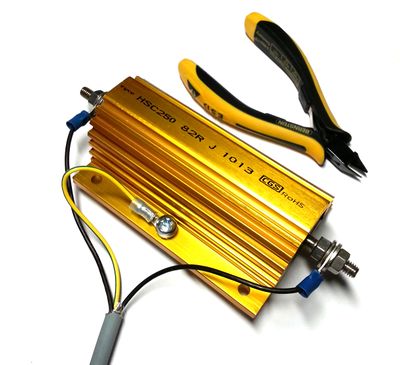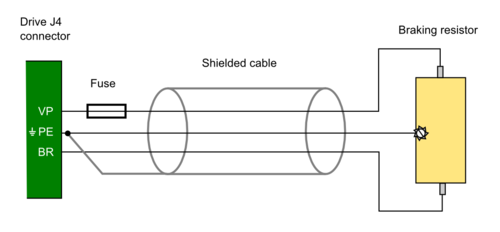Difference between revisions of "Argon user guide/Braking resistor"
| [checked revision] | [checked revision] |
(→Suitable resistor type) |
|||
| Line 6: | Line 6: | ||
Argon supports connecting braking resistor directly to drive [[Argon_wiring#J3_24V_power_and_motor_brake_port|J4 connector]]. | Argon supports connecting braking resistor directly to drive [[Argon_wiring#J3_24V_power_and_motor_brake_port|J4 connector]]. | ||
==Suitable resistor type== | ==Suitable resistor type== | ||
| − | + | Characteristics of Argon regenerative resistor output: | |
| − | *Resistance 80-100 ohms | + | {{Argon regen resistor specs}} |
| − | *Power rating 150-300 Watts | + | Recommended resistor specifications: |
| − | *Wire wound construction (no film resistors) | + | *Resistance 80-100 ohms @ 220-240 VAC |
| + | *Resistance 40-50 ohms @ 110-120 VAC | ||
| + | *Power rating 150-300 Watts, this may greatly vary depending on how much energy the braking resistor must absorb | ||
| + | *Wire wound construction (no film resistors unless high peak energy capable) | ||
*Preferrable in metal housing for grounding/noise shielding | *Preferrable in metal housing for grounding/noise shielding | ||
The 250W resistor in the image can absorb enough peak energy to stop 100 kg mechanical linear axis moving up to 3 m/s. | The 250W resistor in the image can absorb enough peak energy to stop 100 kg mechanical linear axis moving up to 3 m/s. | ||
| − | Example of suitable resistor: Tyco HSC 250 82R [[Media:tyco_power_resistors.pdf|(data sheet pdf)]]. | + | Example of suitable resistor for most 220-240 VAC installations: Tyco HSC 250 82R [[Media:tyco_power_resistors.pdf|(data sheet pdf)]]. |
==Installation== | ==Installation== | ||
Revision as of 22:37, 10 August 2013
Regenerative resistors are usually a required part with servo drives to absorb returned energy from decelerating or braking servo axis.
Servo drive with motor can act two ways: energy supply and energy generator. The generator behavior occurs during decelerations and this causes current flow from motor to drive power supply capacitors. If that generated energy is not absorbed anywhere, the voltage of capacitors will rise above overvoltage threshold and trigger an software clearable overvoltage fault.
Argon supports connecting braking resistor directly to drive J4 connector.
Suitable resistor type
Characteristics of Argon regenerative resistor output:
| Property | Value | Units |
|---|---|---|
| Maximum current | 6 | A |
| Series fuse | 8 | A |
| Minimum allowed resistance @ 230 VAC supply | 63 | Ω |
| Minimum allowed resistance @ 115 VAC supply | 35 | Ω |
| Resistor power dissipation | 0-2400¹ | W |
¹) Power dissipation depends on how much system's kinetic energy is directed to the resistor Recommended resistor specifications:
- Resistance 80-100 ohms @ 220-240 VAC
- Resistance 40-50 ohms @ 110-120 VAC
- Power rating 150-300 Watts, this may greatly vary depending on how much energy the braking resistor must absorb
- Wire wound construction (no film resistors unless high peak energy capable)
- Preferrable in metal housing for grounding/noise shielding
The 250W resistor in the image can absorb enough peak energy to stop 100 kg mechanical linear axis moving up to 3 m/s.
Example of suitable resistor for most 220-240 VAC installations: Tyco HSC 250 82R (data sheet pdf).
Installation
The image above shows proper wiring of braking resistor. Proper installation has:
- Shielded cable with 3 conductors with wire gauge at least 0.75 mm² / 18 AWG
- Cable shield AND earth conductor connected to drive PE terminal
- Earth conductor connected to resistor casing. Place toothed locking washers between wire terminal and resistor to break the insulating coating of resistor case.
- Two other conductors connected to resistor terminals through 8A fast blow fuse
- Resistor should be also mounted on heat sink
- Additionally it is a recommended to shield the resistor terminals from accidental touching
| The terminals of the resistors are connected to dangerous voltages. Never touch them before drive power has been safely discharged. |

